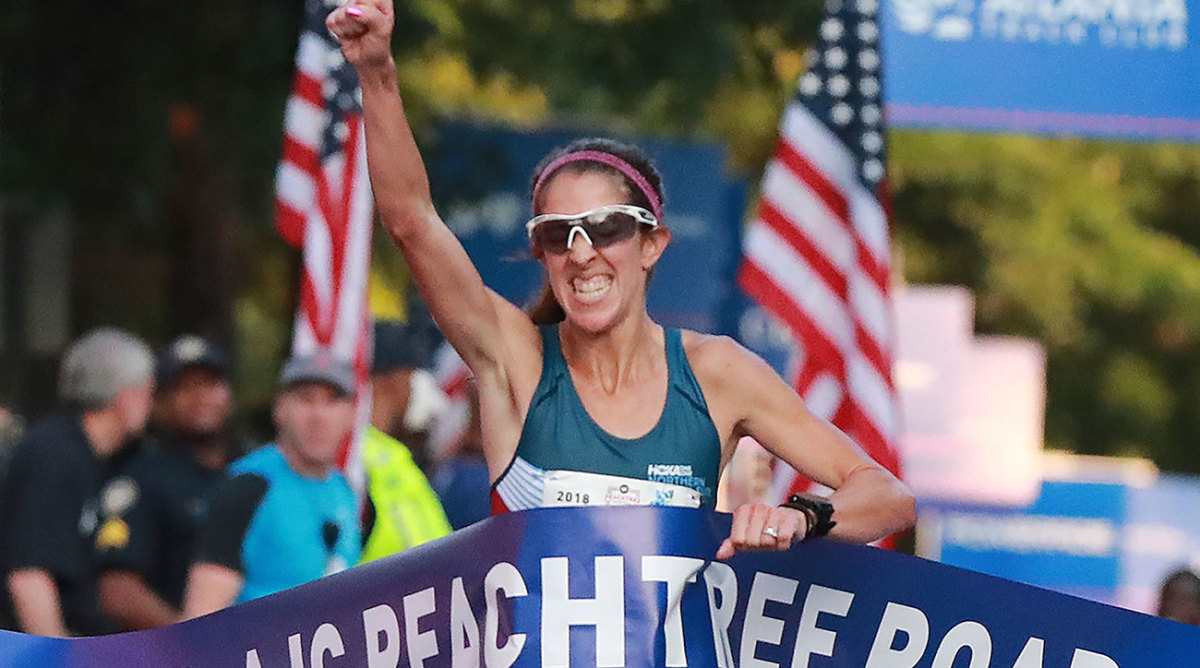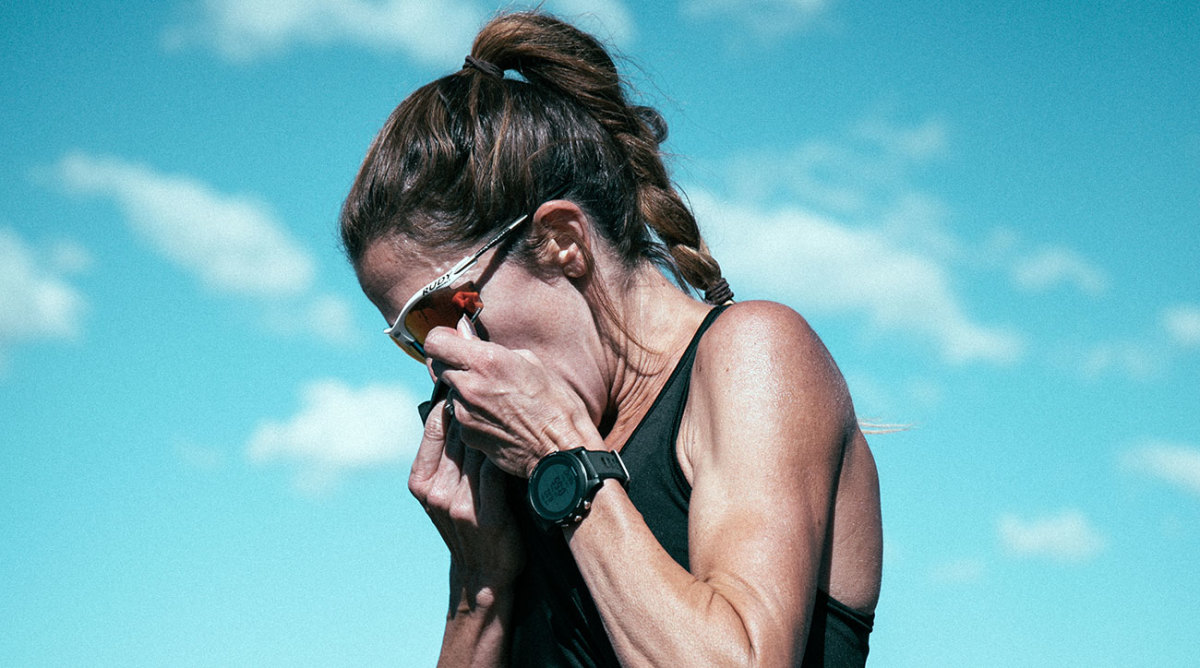Can Stephanie Bruce Seize Another Breakthrough Performance at the NYC Marathon?

NEW YORK — Stephanie Bruce couldn’t fully describe it.
It’s been more than three months since Bruce felt the tape break around her body at the finish line, but the 34-year-old runner still can’t quite find the words to explain her emotions after finishing first at the AJC Peachtree Road Race in July, which also served as the USA Track and Field 10K Championships.
Maybe it was appreciation. Or a sense of gratitude for the second half of her career that she never thought she'd have after giving birth to two boys in the span of 15 months. Maybe it was validation. Or relief that she finally had proof that she can be a winner after a string of top-ten finishes and the numerous challenges she had to navigate.
Whatever it was, you could see it—smile wide and fist pumping in the air—as the realization hit her in that moment.
For the first time in her 10-year professional career, Bruce was a national champion.
“That was one of the most special moments of my coaching career, seeing her breaking that tape,” Ben Rosario, Bruce’s coach, said. “That smile wasn’t from the race itself. That smile was from all of the work she put in to get there, the years of ups and downs that were building up to that moment.”
It was only a matter of time. In what has arguably been her strongest year yet, Bruce has been slowly working her way up the professional ranks, and Rosario knew she was at the brink of something big.
He still does. As he helps her prepare for this year’s New York City Marathon on Nov. 4, Rosario believes that there’s more to prove. That there’s still more to Bruce’s potential. That New York could be the chance to show the nation: Stephanie Bruce is just getting started.

It was Feb. 16, 2002, when the runner met her first life-altering hurdle.
Bruce was a senior at Xavier High School in Phoenix, Ariz., and just months away from graduating when her father, James, died of prostate cancer at 55 years old. She was grieving, suffering through pain and anguish that she had never experienced at that level before. The hurt carried over to her first years at the University of California-Santa Barbara, and it was in the midst of those tears that she realized she had a choice to make: Give up or keep running.
“When you go through sorrow and tragedy, you can go down dangerous paths like those of drugs and alcohol, or you can find a way out,” Bruce says. “I knew I couldn’t do that, so I went down the path of running, and that was such a healthier path to find. I was lucky that somehow as an 18-year-old I discovered that, because that was my first jolt of motivation.”
Bruce hasn’t looked back since. As a young professional, she placed second at the U.S. 20K championships in 2010 and third at the Houston Marathon in 2011, where her time of 2:29:35 still remains a personal best.
Her résumé quickly began including a series of top finishes. First place at the Big Sur Half Marathon in 2012, top American at the NYC Half Marathon later that year. Ready to take it to the next level, she made her first major marathon appearance, placing 15th overall ––the third American woman ––at the 2013 Boston Marathon.
Bruce wasn’t satisfied. It didn’t matter how many times she came close to the top. Her narrative was being written, and as far as she was concerned, there were clear gaping holes.
No major marathon wins. No national titles. No Olympic appearances.
“My narrative was, ‘You don’t win. You get second and third. You get outkicked,’” Bruce says. “There were times where it was discouraging and there were moments where I’ve had to question and wonder, ‘Am I supposed to be doing this? Am I as good as I deep down believe I am?’”
She was determined to find out. After taking a break in 2014 to start a family, Bruce had her eyes set on the U.S. Olympic Marathon Trials in February 2016.
“She’s a fierce competitor, as fierce of an athlete that you’re ever going to find,” Rosario says. “I saw her work so hard to come back, to battle through the difficulties having a child has on the body. And I truly believe she was ready to come back even tougher and stronger than she was before.”
But the comeback would have to wait. Six months post-partum, life presented Bruce with another unexpected twist.
Life in her household is often times madness, but Bruce wouldn’t have it any other way.
Sure, she sometimes misses being able to sleep until nine and it would be nice not to have dirty laundry lying around the house...and yes, she could always use an hour or two more of silence. But with two sons––Riley, 4, and Hudson, 3––born 15 months apart, Bruce has grown accustomed to a busy life.
“It’s a blessing, really,” Bruce says of being surprised by her second pregnancy. “It has taught me perspective. Obviously running is a huge part of my life, but I also have these two little humans I’m raising. Now when I’m away on races, I’m even more determined to make the most out of the race so it’s worth being away from them.”
Her return wasn’t easy. After missing the better part of three years, Bruce often doubted whether a comeback was even possible. Her pregnancies left her abdomen split, a condition called diastasis recti. Battling through pelvic pain, she qualified for the Olympic trials in the 10,000 meters with a personal best 32:14.42 but only to face disappointment once again. She finished 20th out of 22 runners at the U.S. Olympic Track and Field Trials in July.
In November 2016, a more dire struggle took precedence. Bruce’s mother, Joan, was diagnosed with inflammatory breast cancer.
“I just remember thinking to myself, ‘You can’t possibly lose two parents to cancer, can you?’” Bruce says. “And then I realized, 'Yes you can. Life doesn’t care.'"
Bruce became her mother’s primary caretaker and helped Joan through chemotherapy, a double mastectomy and radiation. Like she did 15 years earlier, Bruce turned to running to push her through the pain.
“I don’t know what kept me going, honestly,” Bruce says. “I just have a deep intrinsic motivation that I want to find out how good I can be, and running serves the purpose in life that, when we have so many things that get thrown at us that we don’t have control of, we still have control of how much we can push ourselves in running. It just made me feel alive to be able to do it. It’s resisting complacency.”
Her conviction was continuously being tested, however. Race after race, she could hear her narrative out loud. You don’t win. You get second and third. When Bruce finished 10th in the NYC Marathon last fall and again in London this April, both the athlete and her coach were left frustrated, feeling like she was just scraping the barrel of her potential.
Others may have called it quits. Bruce used it as motivation.
“I realized after London that you’re able to change your narrative in one day and in one moment as long as you’re willing to change how you define yourself going into races,” Bruce says. “I decided that was the approach I would take this summer. Even though I haven’t had a ton of those moments, if I keep chipping away, it will come.”
On July 4th, at the USATF 10K Championship in Atlanta, it did.
She wasn’t the favorite to win. That title belonged to teammate Aliphine Tuliamuk, a nine-time U.S. champion and last year’s Peachtree winner. But Bruce embraced the underdog role. She knew she had speed. She knew she could kick really well, too. And after a decade of telling herself she couldn’t break the tape, she did and captured her first national title with a late-race surge.
“It was as if everything I had been through, every part of the last ten years, were leading up to that moment,” Bruce says. “I just kept thinking to myself, ‘It’s about time.’ And yes, it took me ten years to win a national title. But if I had thought that I was never going to get there and have thrown in the towel after having kids, after all the shortcomings and challenges and struggles, this summer never would have happened. It makes me excited for the future and gets me thinking that, at any given race, I shouldn’t count myself count. I have a chance.
“I can be a winner too.”

The quote—a reminder pulled from James Kerr’s Legacy, a book on the All Blacks of New Zealand—has been embedded in Bruce’s mind for the past three months.
“‘When you’re at the top of your game is when you have to change your game,’” Bruce says.
Her national title win gave the 34-year-old freedom she hasn’t felt in years, but it did not make her complacent. It’s the opposite. The win allows Bruce to take risks in training, racing and coaching.
With one goal accomplished, others have replaced it. Win a major. Make the Olympics. Enjoy it as it comes.
“Every season and every year that I have in running is a gift,” Bruce says. “Things can end tomorrow. I missed a few years, but I am so fortunate that now I have a three- and four-year-old, and I feel like I have a second half, almost like a new career ahead of me. I do want to make an Olympic team one day, but I don’t want that to define my career, so going into New York this year, it’s just another opportunity to see how I can do on the day.”
How that day plays out, neither Bruce nor Rosario can know for sure. The team is avoiding any time goals, steering clear of any rigid expectations. Besides, Rosario has already seen Bruce do what he never thought possible.
It’s why he still believes it’s only a matter of time before Bruce has another breakthrough. All the signs are there. She’s healthy. She’s fit. Even throughout a grueling routine––Rosario has her running mile repeats, steady states and progression runs up and down Lake Mary Road in Flagstaff, Ariz. and with her mileage totaling anywhere from 110 to 120 miles each week –– Bruce has an energy and a confidence Rosario says has never been stronger.
This is why despite not being listed as any type of favorite, Bruce isn’t counting herself out. She’s the creator of her own universe, and if she can lose loved ones, watch other ones suffer, give birth twice, come up short and still find the will to finish, she knows anything can be hers for the taking. Ten years has been a long time coming, but that’s why Bruce is working harder than she ever has before.
That’s why, heading into New York, she can say simply, “The best has yet to come.”
